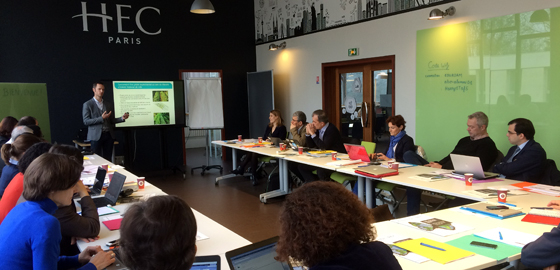“I am convinced we are building something big here. These preliminary results are encouraging. We enjoyed insight into pioneering research, as well as strong interaction between the commercial partners, the Action Tank, HEC teachers and the SnO researchers. We are also witnessing a convergence between six multinational companies, all members of the Movement.” The words of Danone’s Senior Vice President in Corporate Affairs and Business Sustainability Integration, Emmanuelle Wargon, echoed a general feeling of optimism following the daylong meeting between HEC collaborators, students and fellow corporate representatives.
In the course of a breezy Tuesday, around 70 people were involved in the on-campus exchanges, a landmark in the Movement’s young history. 16 months after its launch, eight SnO researchers shared their respective work on topics related to an inclusive economy, as well as the challenges they have face and the ways forward in expanding the MB*SI programs.
Representatives from each of the research teams compressed their work into dynamic three-minute pitches before opening up to the floor. These ranged from Mark DesJardine’s work on the effect of hedge fund activism on corporate social performance, to the questioning of the reliability of hybrid organizations by Bertrand Quélin. The five papers were complemented by a social impact strategy report by Sookyoung Lee and Zachariah Rodgers; followed by Marieke Huysentruyt’s large-scale field experiment on reaching beneficiaries in social impact programs. “All these presentations have been impressive,” asserted Action Tank director Jacques Berger, “but Marieke’s pitch has been particularly useful for me because of the operative nature of the field work that she has established.”
How Using Empathy Opens New Avenues
The fieldwork by the Assistant Professor of Strategy focuses on families in Seine Saint-Denis, France’s poorest department featuring the country’s highest birthrate. “Our study involving 5,551 families reveals that empathy with the families’ situation can increase adherence to social impact programs. This is the first time it’s been tested scientifically and the results seem unequivocal: the increase in take-up rates ranges between 16 and 27%,” she told the donors and fellow-researchers gathered in the campus library. Marieke Huysentruyt and SnO Academic Director Rodolphe Durand will be pursuing their research in this department north of Paris, by also focusing on ways of improving the performance of the 150 intermediaries through empathy.
“What is making us very confident in the SnO Movement is the scaling up we’re seeing,” confided the Renault Director of Social Business and Road Safety Program, François Rouvier. “We can feel a shifting of gears within the companies too. I’ve retained two ideas: the influence of social business on the financial side, how it can positively affect stakeholders’ attitudes. And the measurements used to gauge social impact; research on this is producing new proposals we hope to feed into our own practices. The empathy of the message, for example, which is much more than a marketing ploy to get people onboard.”
Going Beyond the Bottom Line
Schneider Electric is working with HEC researcher Luc Paugam on the links between CSR disclosures and the probability of inclusion in a major sustainability stock index; he then studies the impact of this inclusion on the share value. Schneider is also seeking to bring cost-effective, reliable energy to populations in Africa which are unable to access the grid. The company’s Senior Vice-President of Sustainability and Inclusive Business, Gilles Vermot-Desroches, quoted the historic figure Peter Drucker who believed hard figures and stock exchanges performances were less important than strong leadership and a vibrant entrepreneurial culture for sustainable development in firms. “In the coming year, I hope the MS*BI will also focus its research and teaching on these factors,” he said. “These so-called ‘soft sciences’ are dear to a new generation of students whose vision goes beyond the bottom line. Major companies like Schneider must take into account this upcoming generation of leaders who put climate, biodiversity and sustainable development ahead of financial gains. Accept it, or we’ll be buried.”
In SnO’s preliminary report “Social Impact Assessment Strategy”, co-author Rodolphe Durand shares much of this analysis: “Financial analysts and investors are also paying increasing attention to non-financial factors such as environmental, social and governance (“ESG”) factors,” he writes in the 92-page report. “They are seeking to reflect a firm’s contribution to sustainability and ethical issues into valuation of the firm.” Looking into the future, the SnO Academic Director is calling for further research into accurate results of social programs and advancing new social impact measurements.
Another of the Movement’s priorities in the coming year, is the internationalization of its objectives, as outlined by SnO’s Executive Director Bénédicte Faivre-Tavignot. She outlined upcoming collaborations in Africa and India. In the latter, Ashoka University, based north of Delhi, is hosting Faivre-Tavignot in April as she conducts a course on social and inclusive business for big companies. “An event with Professor Yunus will also be co-organized by Ashoka University and HEC, at the Residence of the French Embassy, in partnership with the French-Indian Chamber of Commerce and the Indian Action Tank,” she revealed. “ CEOs from Indian and French firms will be invited: the idea is to explore with them the societal and strategic implications of social business for big companies. Your subsidiaries in India will be invited” she told the Movement sponsors. “In the long run, the university intends to create a Chair devoted to this issue. Perhaps you can help?”
